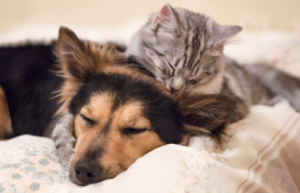Caring for a new kitten can be a complicated task, even choosing which kitten to bring home is a big decision. A new kitten isn’t all playing and cuddles, this new pet is your responsibility. You need to look after their health, their diet, and their entertainment. There is a lot to consider in the first few weeks of having your kitten at home but if you can get them started on the right foot then the transition to adulthood will be easier.
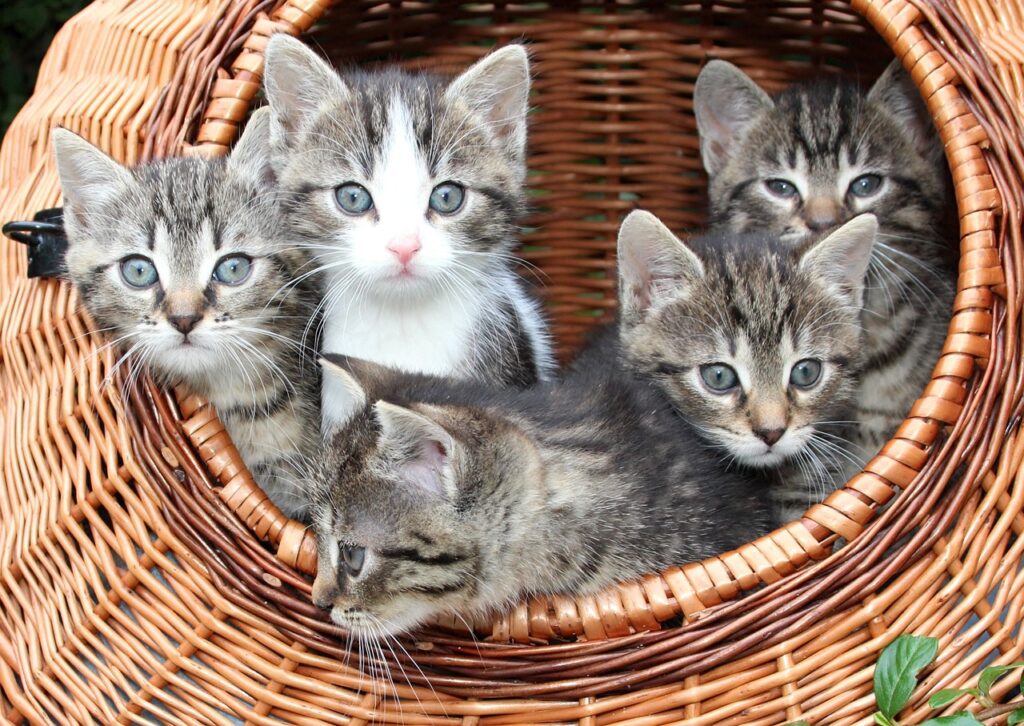
Decide on the breed
The first big decision is which type of cat you want. You have the option of rescuing or going through a breeder unless your cat is pregnant herself. You have to decide between a pure breed cat or a mixed breed cat. Mixed breeds cats are a little simpler and you’ll find a lot more breeders. With a Pure Breed you will be able to choose a breed closer to what you want, they have easier to predict personalities and appearances. If you want a specific breed, you will likely have to go through a breeder of that specific cat. However, if you’re happy with a mixed breed you can consider adopting a kitten.
Health history of the parents
If you’re going through a breeder, there are some key things to ask the breeder before making your decision. You should look into the health of the kittens and their parents. It is important to know that the mother is healthy and up to date with vaccinations. You should also look into how many litters that cat has had. A breeder that has new kittens almost constantly probably isn’t taking proper care of their cat and should be avoided. Knowing about their parent’s health can also give you a warning about any hereditary diseases
Caring for A Kitten – Health
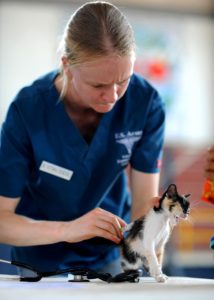
Before you can even bring your kitten home, you need to have a few things taken care of. The first is their vaccinations. These should happen before your kitten comes home with you and you should ensure your breeder has taken care of this. Caring for a kitten is easier if you start off on the right foot.
Kittens shouldn’t be separated from their mother until they are eight weeks old. This should mean you don’t have to worry about a few of these early life vaccinations.
Vaccinations
Kittens need to be vaccinated within their first nine weeks. Ideally, this will have happened before you bring them home but sometimes this isn’t possible. If your breeders haven’t taken care of the first batch of vaccinations for some reason, you will have to see a vet and do this.
Once you have your kitten at home, there are some other things you can do to take care of your new pet’s health. The first is to find a vet. You don’t need to use the same vet as their breeder did, but finding one while the kitten is young will help the vet keep on top of their information, like when vaccinations are due. Once your new kitten is three months old, they need their next set of booster vaccinations. This is followed by a ‘booster’ set every twelve months after this. These jabs are really important when caring for a kitten.
Check-Ups
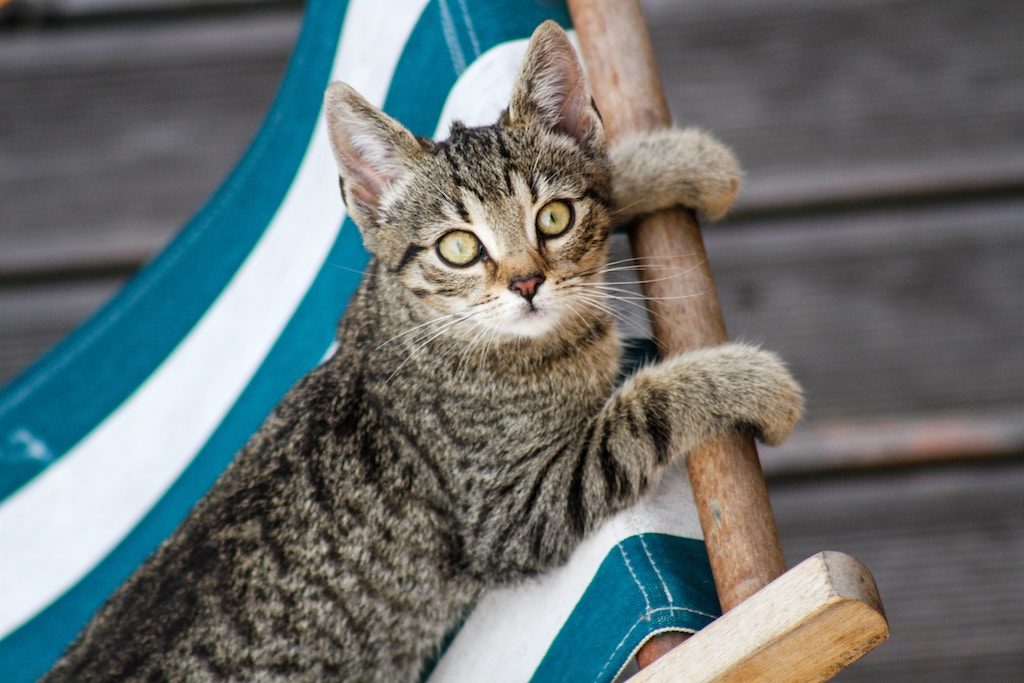
Your vet can give your kitten a general check-up while administering vaccinations. This will make sure that you and your new kitten are getting off to the right start. You should consider whether you eventually want to neuter or spay your cat. Discuss this with your vet first to ensure you know when it is safe to do that. Caring for a kitten means being responsible for their health, you should consider setting up pet insurance to help with any vet costs. It is unlikely to come up while they are young, but having a long-standing pet insurance policy can save you a lot of money and difficult decisions later in life.
Flea and worm treatment
Flea and worming solutions can be done by your vet, but it is easy enough to do at home. They should be done at regular intervals until they are six months old and then every three months after this. Fleas and worms aren’t as much of an issue for indoor cats, but they can still get them so it is important to stay up to date with this when caring for a kitten.
Caring for a Kitten at Feeding Time
Caring for a kitten includes supervising the transition from milk onto solid food. If you’re adopting a kitten, this transition should have already happened by the time you bring your kitten home. Kittens naturally begin to reject their mother’s milk at around four weeks old. They will transition onto kitten food gradually after this age. To help make this transition easier for your cat, you should try and feed them on the same brand of food as they previously ate. You can move them from the brand their old home used onto your preferred type by gradually mixing the two. This way you can be sure they won’t have a negative reaction to their new food. If the food they were previously eating is so poor that it negates this benefit, it’s fine to just ignore the previous choice.
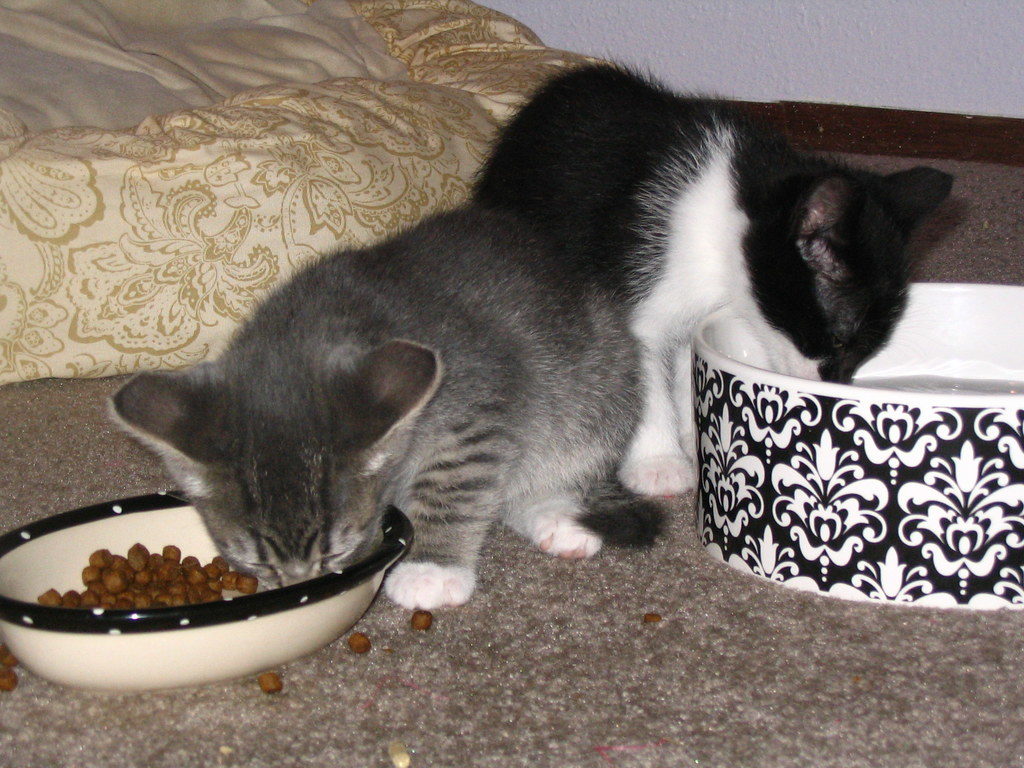
Have feeding bowls ready
You also need to make sure your home is ready for a new kitten. There are some items that you need while caring for a kitten. These are typically the same for both indoor and outdoor cats. You’re going to need food and water bowls. The size of these depends on how long you want them to last. A kitten can keep the same bowl for the whole time they’re growing, although you should wash it regularly and replace if it gets a bit worn out.
You can use a smaller kitten sized bowl at first and then replace this when your kitten grows. However, this is a little unnecessary. You can just buy a bowl that they can use at any size or age. A smaller kitten will cope with a bigger bowl, as long as it fits a full meal in it in adulthood.
Sleep Time – Caring for a Kitten at Sleep Time (and Naps Time!)
Some pet owners are happy to let their new kitten sleep in their bed. However, this isn’t for everyone. Even if you give your new kitten freedom to sleep anywhere, they’re going to need a warm spot for naps throughout the day.
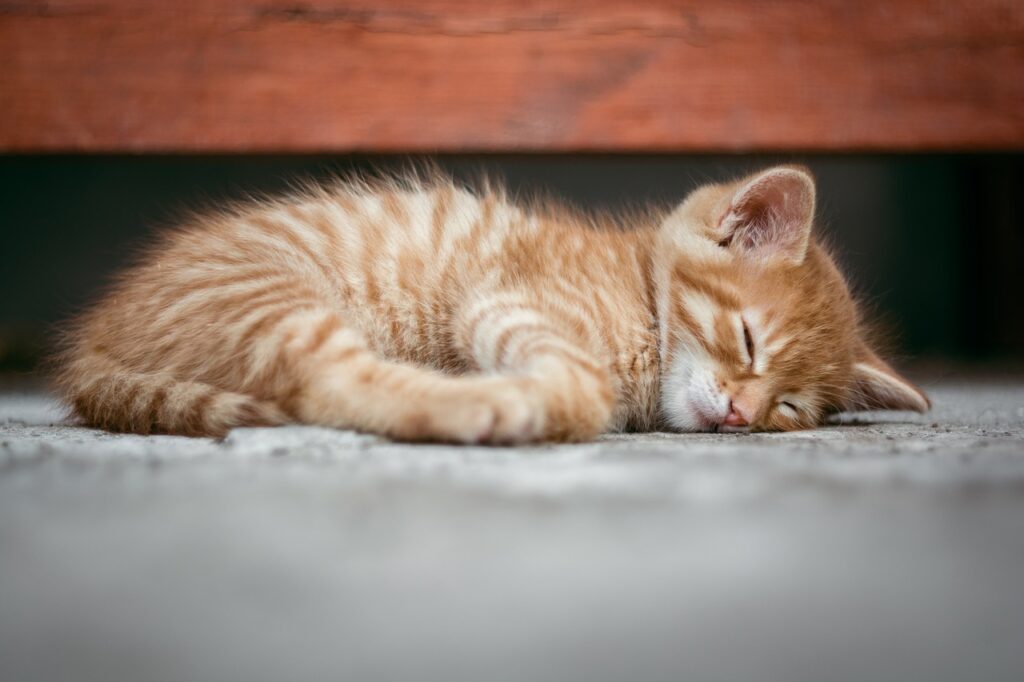
A kitten specific sized bed is a good choice for somewhere secure to sleep. A young kitten gets a lot of use out of a bed, so this is one area where you should consider buying one that is kitten specific. This can be replaced with a larger bed while they’re an adult. However, when they’re grown up you will have a better understanding of where they like to sleep. Some indoor cats might be more at home on furniture or prefer a cat bed. You can cater your replacement bed to what you think they need once they’ve grown up. A smaller one will be fine whilst you’re caring for a kitten.
Play Time
For both indoor and outdoor kittens, playtime is really important. A vital part of caring for a kitten is making sure that they’re entertained and get plenty of stimulation. All cats should remain indoors until they are six months old. This means you’re going to need plenty of toys for them even if you plan on making them an outdoor cat.
Toys
An indoor cat will need more toys for stimulation when they’re an adult then an outdoor cat does. With this in mind, you might want to consider what toys you buy and how long they will last. An outdoor cat will be fine with toys that will suit them up to six months of age. This can be smaller, like a medium-sized scratching post and some simple toys. Mice toys to chase can work, or balls with bells, even something hanging from a string. However, if you plan on having an indoor cat you will need to replace some of this. Most indoor cats get a lot of stimulation out of cat trees. Rather than purchasing one for a kitten, just get them a small scratching post and wait until they’re an adult to invest in a full-sized cat tree.
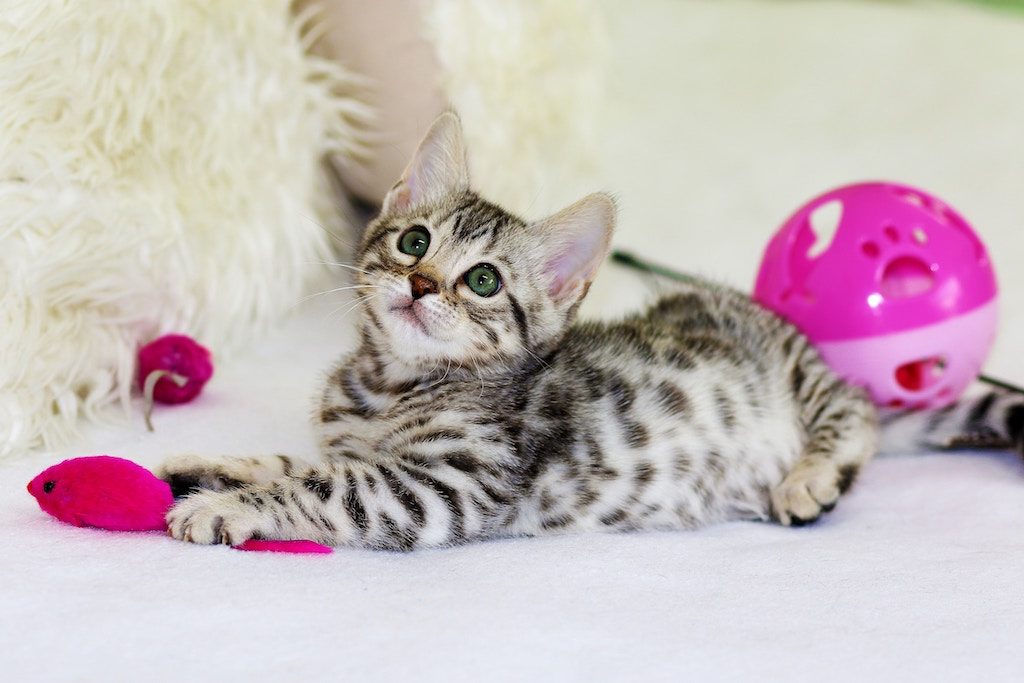
An indoor cat will need other stimulating toys, like a Kong toy or other interactive toys. Most of these will be fine for use by both a kitten and an adult cat. This should make caring for a kitten a bit easier on your wallet.
Poop business
Pooping when you are a kitten
This is never the easiest topic, but your cat going to the bathroom is a vital part when you’re caring for a kitten. You’re going to need a litter box that suits a kitten. A smaller one will be easier to use. However, it is probably for the best to buy a larger litter box that will last them a little longer. Of course, a box too large for a kitten to enter won’t be appropriate, a medium sized litter tray should accommodate them until they grow while not being too big for a kitten to enter.
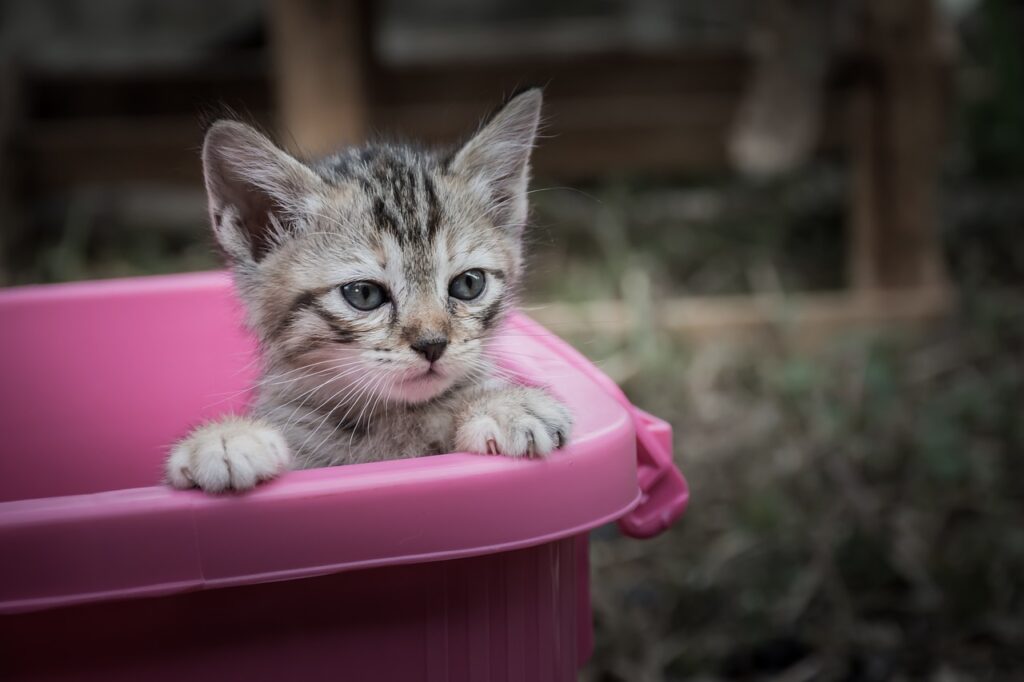
Toilet needs when transitioning to adulthood
It can be hard to predict how your cat will behave with a litter box when they reach adulthood. Some cats kick litter around and make a real mess, this makes an enclosed litter box a good choice. However, others just need a properly sized litter tray. You should be prepared to replace your cat’s kitten litter box once they’re an adult. They will likely outgrow it and with a second litter box, you can tailor it more specifically to your cat’s behaviour.
Remember you are the responsible parent for this cute fur ball!
Caring for a kitten involves taking care of their health and all of their needs. Kittens are higher-maintenance than adult cats, so it isn’t going to be the easiest period. Having a kitten is a special time in their lives. You get to enjoy a new pet’s company as it discovers the world for the first time and set them up for a healthy adult life.






